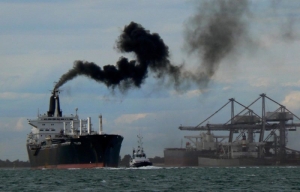


(Posted on 07/01/19)
By utilising waste heat recovery and using modern technology like machine learning to create virtual fuel meters, the shipping sector can reduce both its emissions and its fuel consumption. This is shown in a new dissertation by Fredrik Ahlgren at Kalmar maritime academy at Linnaeus University.
The ships of today collect large quantities of data from their engines and machines when operating, like engine speed, temperatures, and pressure. During the work on his dissertation, Fredrik Ahlgren, doctor of maritime science at Linnaeus University, got the idea to combine these data in order to use machine learning to create virtual fuel meters. These can then show the consumption in real-time without having to install physical fuel meters.
“The virtual fuel meters can help crews bring their ships forward in a more energy-efficient way. Thereby also reducing emissions of hazardous substances like greenhouse gases and other pollutants”, explains Fredrik Ahlgren.
The shipping sector is facing a major challenge to radically reduce its emissions of carbon dioxide, particles that are hazardous to the environment and to human health, and sulphur and nitrogen oxides.
“Today, emissions from the shipping sector make up roughly 11 percent of the total carbon dioxide emissions from the transport sector. If we are to succeed in our work to reduce global climate change and reduce the effects of air pollution on human health, we must work with many methods at the same time”, says Ahlgren.
In addition to the implementation of new technology like machine learning and artificial intelligence, the shipping sector can become more energy-efficient by making better use of the waste heat from ships’ engines. In his dissertation, Fredrik Ahlgren has also made an extensive analysis of how the energy system on board a cruise ship works. This mapping resulted in knowledge about how waste heat in cooling water and exhaust fumes can be better utilised in existing and new equipment on board ships. In particular, Ahlgren studied how an intended installation of a so-called Organic Rankine Cycle can convert waste heat to electricity.
Fredrik Ahlgren publicly defended his doctoral thesis on 13 December and his dissertation has attracted great interest.
“So far, on request, I have sent a couple of hundred copies of the dissertation to different office holders within the shipping sector in northern Europe. This shows that machine learning and artificial intelligence are hot topics and important pieces of the puzzle to create a more sustainable shipping sector.”
Rio Tinto’s first Pilbara-made iron ore rail car has rolled off the production line in Karratha... Read more
Precision meets progress at Phu My Port, Vietnam. The LPS 550 has been deployed to handle bulk commodities... Read more
bound4blue, a global leader in wind propulsion systems, has expanded its industrial footprint in Asia... Read more
As the industry explores multiple decarbonisation pathways, methanol is gaining attention as a practical... Read more
Technology group Wärtsilä will supply an integrated hybrid propulsion system for a bulk carrier... Read more
Superior Industries, Inc., a US-based manufacturer and global supplier of bulk material processing and... Read more
ESL Shipping has taken a significant step forward in digitalisation by deploying a new multichannel... Read more
Condition Monitoring Technologies (CMT) has deepened its presence across Asia’s most influential... Read more
After delivering its first full-scale seagoing project last week, Wattlab signed a contract at Europort... Read more
Steelpaint GmbH has reported strong growth in orders for corrosion protection coatings on Germany&rsquo... Read more